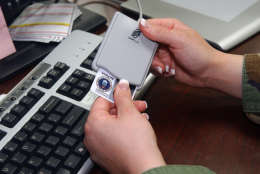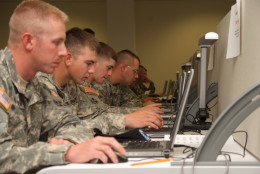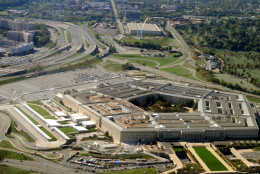Defense Information Systems Agency
-
The Government Accountability Office faults the Office of Personnel Management for not fairly evaluating each of the bids in a $117 million dollar contract.
June 14, 2017 -
The Defense Information Systems Agency is trying to stay ahead of the technology curve. That means putting investments in mobility and the security of mobile devices.
June 13, 2017 -
Alfred Rivera, DISA’s director of the Development and Business Center, said the agency is moving toward multi-factor authentication, including biometrics and other “patterns of life” type of technologies.
April 24, 2017 -
Trump's policies might save some money in DoD by reducing waste, fraud and abuse, but some changes, like the hiring freeze, might do more damage than good to the Pentagon.
April 10, 2017 -
Modernization can mean a lot of things, even if you keep your COBOL systems.
April 04, 2017 -
DISA is hurrying up its work to deliver unified capabilities to the Defense Department nearly a year early.
February 13, 2017 -
In November, when Army officials decided to launch the service’s first-ever bug bounty, one of the key questions they wanted to answer was whether sensitive personnel records were vulnerable to theft by hackers via the…
February 01, 2017 -
The Defense Department and Veterans Administration tell Congress their still working out the bugs at their joint health care facility in Chicago.
January 25, 2017 -
The Defense Department is having a particularly tough time integrating mobile technology into its mission, largely because every attempt to link it to the Common-Access-Card has been too cumbersome. But DISA’s Purebred program may have found a way to bypass the CAC altogether.
January 25, 2017 -
Army Secretary Eric Fanning has issued highly detailed orders to three-and-four star generals in the Army's headquarters and functional and geographic commands, telling them precisely what must be done to close 60 percent of the service’s 1,200 data centers by the end of 2018 and 75 percent by 2025.
January 10, 2017 -
A major Defense Department initiative to protect the military services’ computer networks with a shared system of regionalized cybersecurity centers will face new scrutiny in 2017, both from Congress and from the department’s inspector general.
December 29, 2016 -
The federal government decided to put the Defense Department in charge of building a new information technology backbone to house and process all of the data involved in security clearance investigations, one that would be safer from foreign attacks.
December 19, 2016 -
DoD now has a fully-functional Wi-Fi network throughout much of the building, something that was unimaginable to the Pentagon’s own IT experts as recently as a few years ago because of cybersecurity concerns.
November 21, 2016 -
DISA is trying to speed up its acquisition of collaborative video, voice and data services.
November 17, 2016 -
Charlie Phalen has spent four decades in the personnel security business, most recently at Northrop Grumman, and before that, in top security positions at the CIA and FBI.
September 29, 2016















